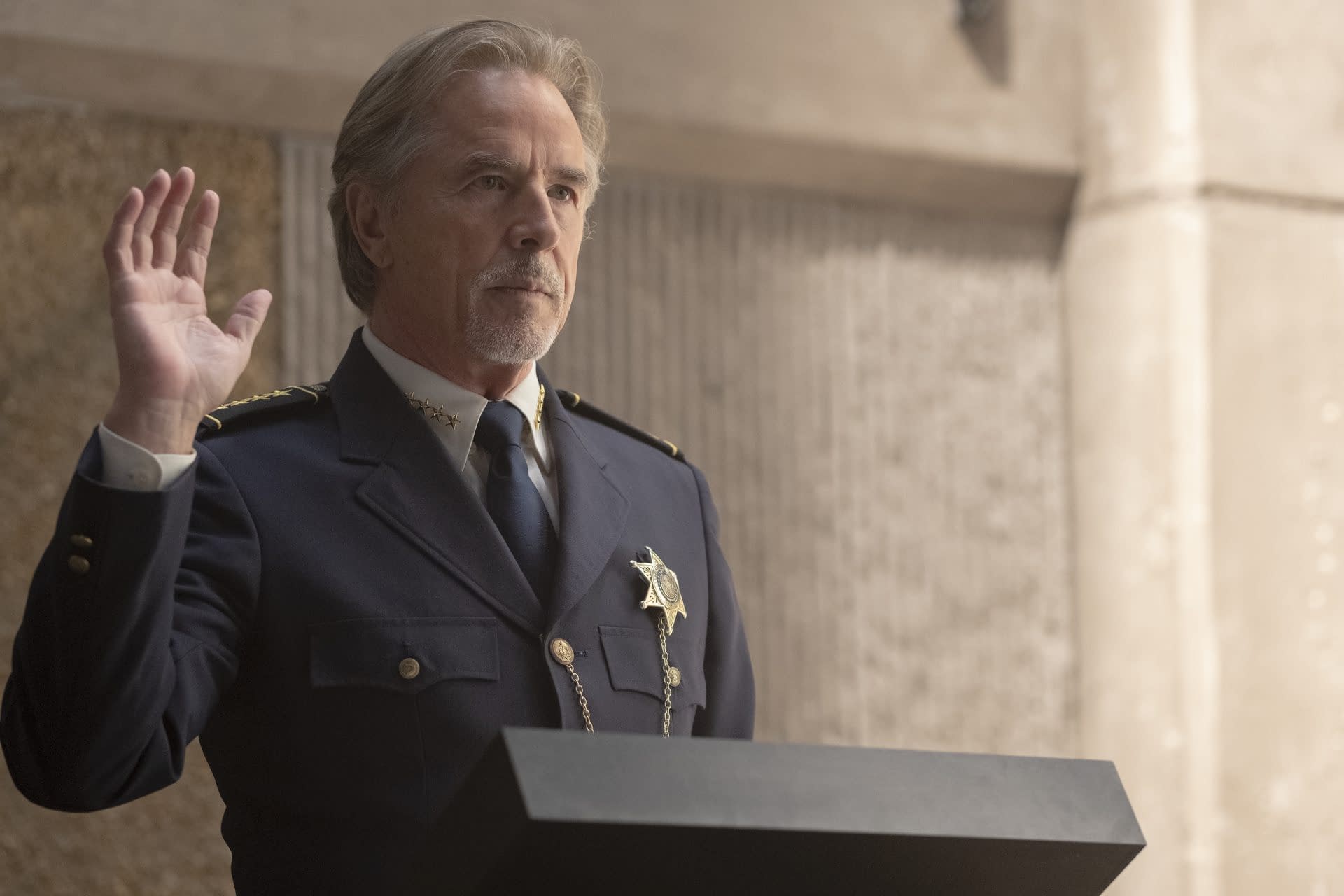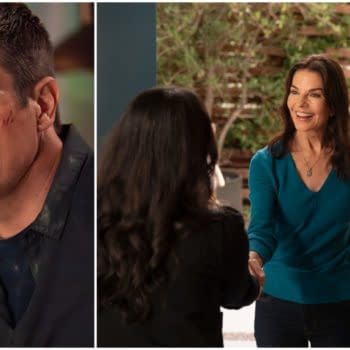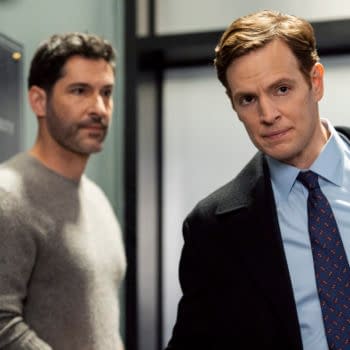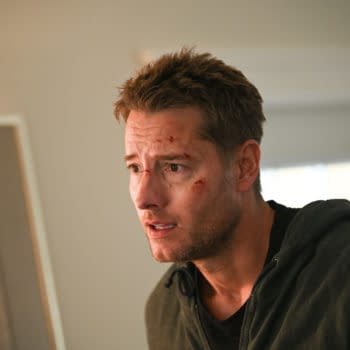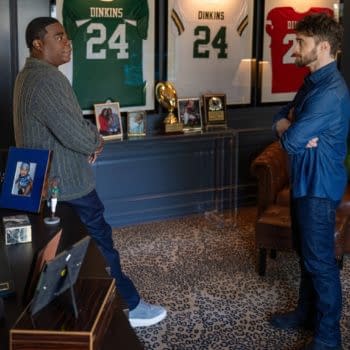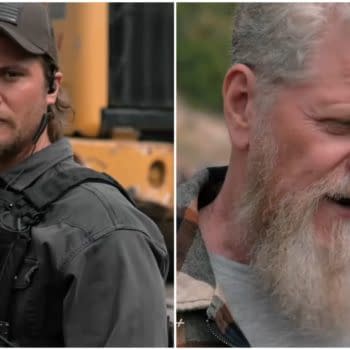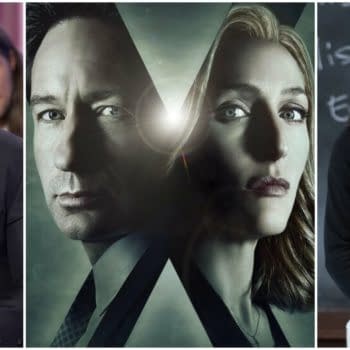Posted in: HBO, Review, Trailer, TV | Tagged: Alan Moore, angela abar, bleeding cool, cable, comic books, Comics, damon lindelof, Dave Gibbons, dc, dc comics, dr manhattan, Episode 1, HBO, it's summer and we're running out of ice, jean smart, jeremy irons, Looking Glass, oklahoma, Ozymandias, Regina King, remix, Review, rorschach, Season 1, seventh kavalry, sister night, streaming, television, tim blake nelson, tulsa, tv, Watchmen
Damon Lindelof's "Watchmen" Free of Compromise – Steps Into Shadows with Anger, Passion [SPOILER REVIEW]
Damon Lindelof's Watchmen is not Alan Moore and Dave Gibbons' Watchmen.
And yet it is.
Thank God (or Dr. Manhattan) for that.
Consider that a "teaser" that will make much more sense over the course of our look at the series' nine episodes, but I want to start off with some confessions and clarifications – just so everyone knows where things stand:
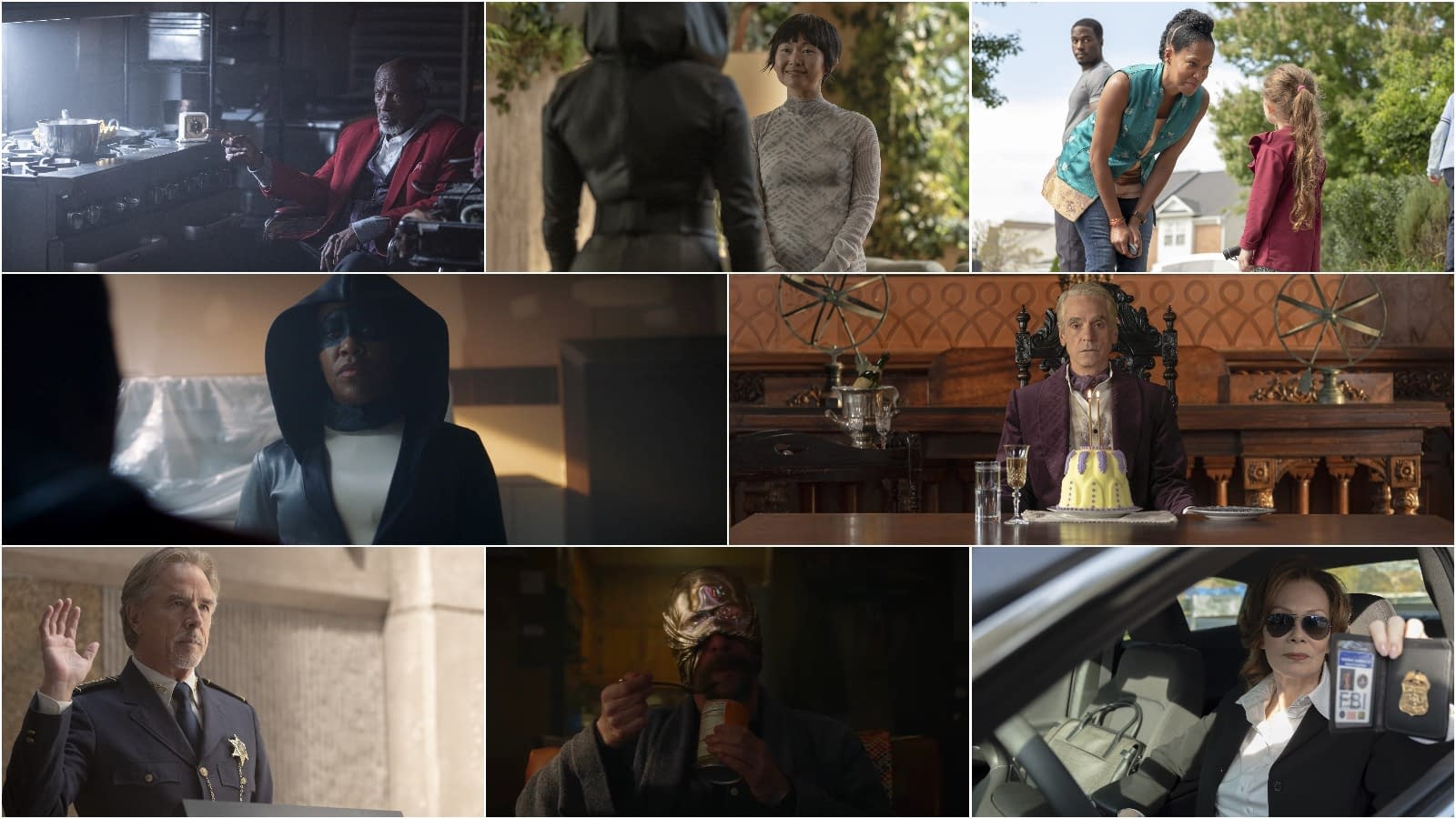
● I consider Moore and Gibbons' work a classic – and no, I'm not adding "modern" to that. The comic book series' narrative and storytelling approach are timeless and yet remain relevant even in the practicality of the day-to-day. Lindelof feels the same way – ensuring that everyone involved knew from the beginning that Moore and Gibbons' work was canon – that it all happened. He even included the squid.
Having seen the first six episodes, I can write without a second's hesitation that not only does Lindelof treat the original work as "sacred ground" but he also expands the universe in a way that both pays tribute to and throws a middle finger up at what came before it.
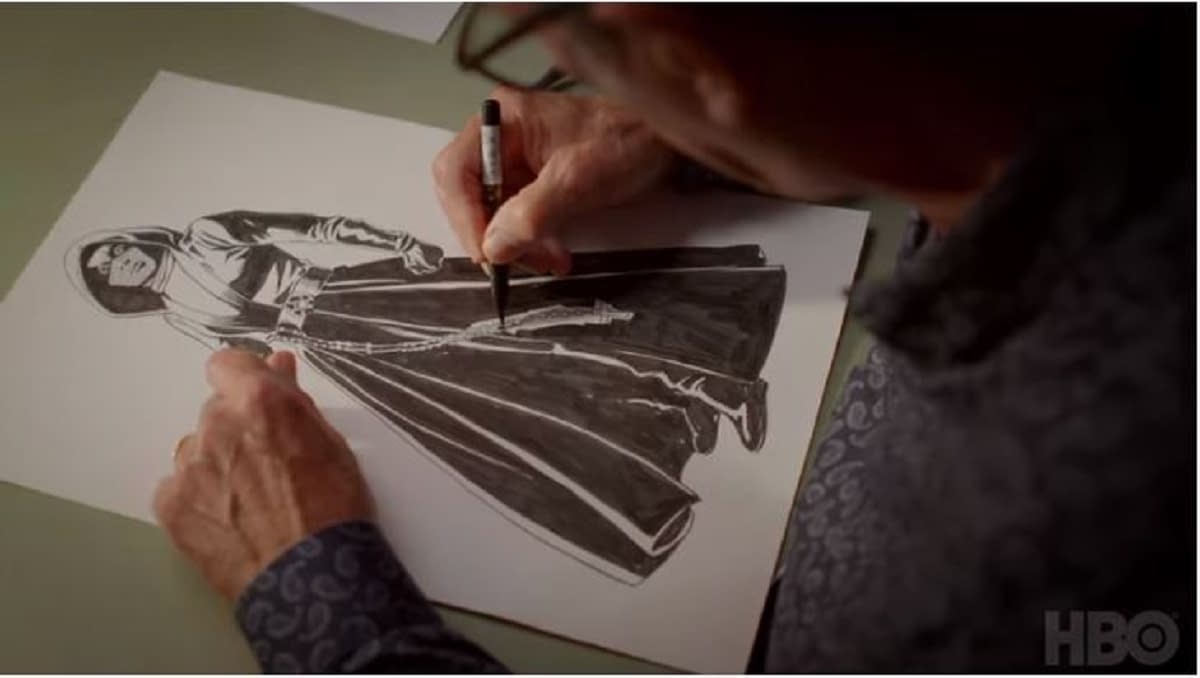
● While I have complete respect for Moore's decision to not be a part of, endorse, or take a dime from any type of adaptation of his work, I have a bit of an issue with some of the arguments made "in Moore's defense" by his fanbase (like he needs defending).
First, this idea that Lindelof (or anyone else) shouldn't have the right to take Moore's work and "do whatever they want with it". Again – with all due respect to Moore – how many people (outside of hardcore geekdom) can pull together a list of Moore's works that they know that don't include characters created by others? Extra points? Count how many time after a V for Vendetta response you hear, "you know, that one with Natalie Portman."
Second, I have to confess that I don't know much about Moore's legal dealings with Warner Bros. over rights issues to publish/adapt the comic book series. It may very well be that Moore's getting righteously screwed – and if that's the case, I feel for him as I would any artist who didn't get a fair shake when going corporate.
With that said – and taking a position that interestingly enough fits in line with what Lindelof's going for with his messaging – it's hard for me to plant my "outrage flag" over Moore's situation. Simply put, on my list of outrages commited by the comic book industry? A white, British guy feeling he was done wrong by the comic book industry doesn't even break my "Top 10". Not when we're talking about the same industry that would never extend the kind of offers Moore had to female creators and creators of color for decades (and still not at satisfactory levels today).
MAJOR SPOILERS AHEAD!
https://www.youtube.com/watch?v=-33JCGEGzwU
"Watchmen" season 1, episode 1 "It's Summer and We're Running Out of Ice": In an alternate America where police conceal their identities behind masks to protect themselves from a terrorist organization, Detective Angela Abar (Regina King) investigates the attempted murder of a fellow officer under the guidance of her friend and Chief, Judd Crawford (Don Johnson). Meanwhile, the Lord of a Country Estate (Jeremy Irons) receives an anniversary gift from his loyal servants. Written by Damon Lindelof; directed by Nicole Kassell.
With something like Watchmen, a totally different approach to reviewing is required. I've seen the first six episodes, and together they form a story that is not only worthy of the name but of the kind of heated debates and discussions over generations its namesake has inspired.
But it's also incomplete – with 1/3 of the series still unscreened – so you see my problem.
Lindelof, Regina King, Jeremy Irons, and others have crafted something powerful and soul-piercing – my personal feeling is that I can't give a full review to artwork that's incomplete. So instead, we're going to offer weekly episode-specific takeaways to keep in mind as the clock tick-tocks closer to midnight, along with meaningful moments from that week's chapter. By the end of this journey, we'll have a clear and complete look at the landscape Lindelof was looking to craft – and if any of it was left behind.
"It's Summer and We're Running Out of Ice": In Moore's Watchmen, we were presented with a view of America from an almost "Englishman in New York" professorial perspective: presenting us with a symbolic look at the nation's woes and human nature, set against the backdrop of escalting U.S.-Russian tensions. Lindelof's approach is less academic and more of a documentary filmmaker – engaging in a kind of "gonzo storytelling," creatively embedding himself to develop a deeper understanding of our nation's true "super villain": white supremacy, white privilege, and cultural appropriation.
Except Lindelof sets aside the symbolism, instead, grabbing you by the back of the neck and forcing your eyes open – to see the innocent blood spilled in the name of "The Great White Way" – to see the innocent blood spilled in the name of the United States of America.
To see the blood that was spilled in Tulsa… in 1921…
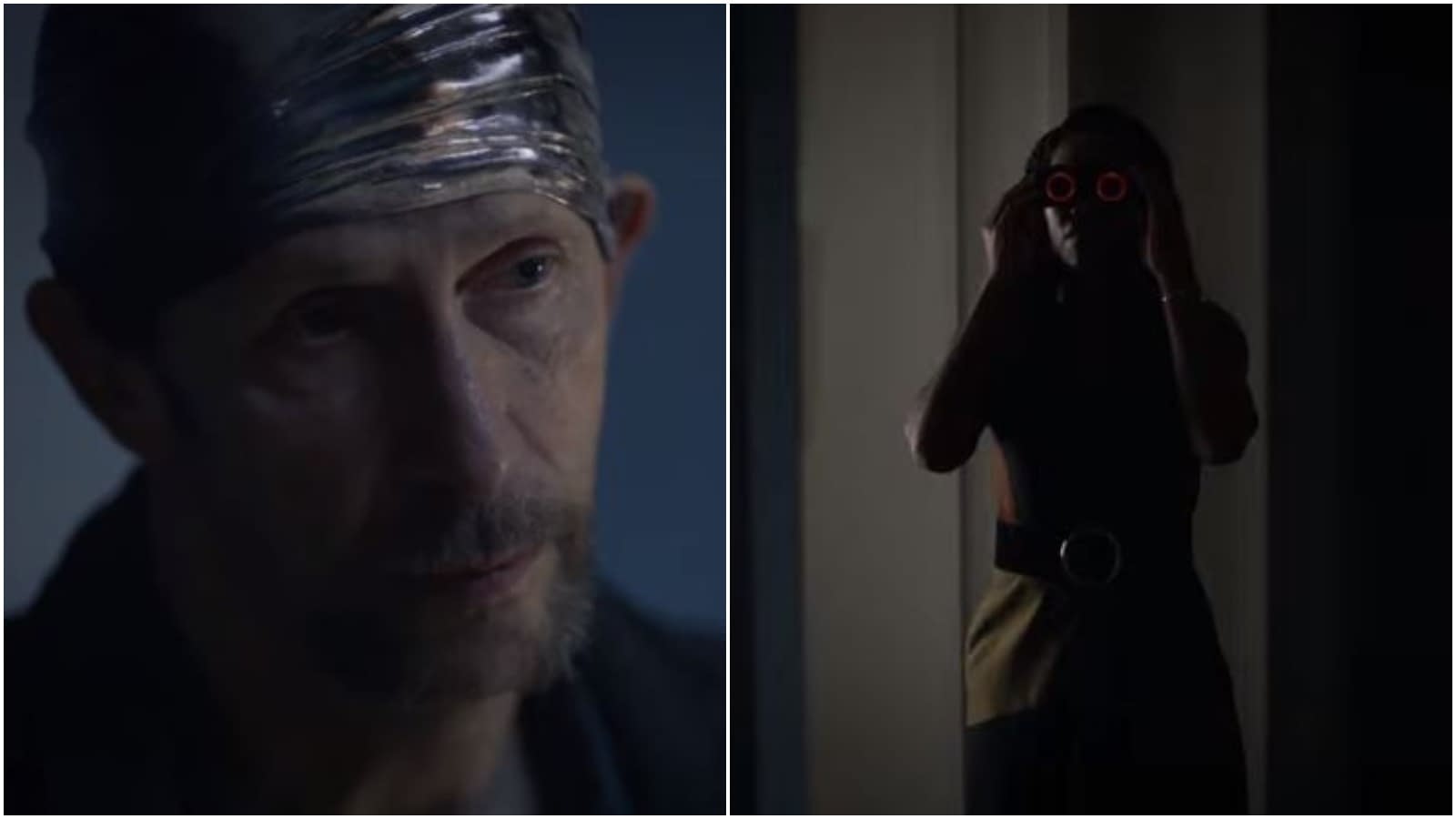
● While Zack Snyder's Watchmen and Lindelof's series both start with "history lessons," the comparison ends there. Our mental "punch-to-the-face" begins with the on-screen heroism of "Bass Reeves: The Black Marshal from Oklahoma" who roams the plains catching bad guys and being celebrated by all (translation: white) townfolk. From there, we are thrust into the horrifically all-too-real world of 1921 Tulsa – and one of the most deplorable moments in this nation's hisotry: the Tulsa Race Massacre. If you're like me, you found yourself flinching at the sounds of the bullets but you would not – could not – look away. The souls lost that day deserved to have their stories told – in a raw, honest way and not the "white-washing" that results over time and by those who control the history books.
● Lindelof had previously mentioned how important of a theme "appropriation" would be in the series – even saying how his working on this series can be seen as an example of that. What's interesting here is how Rorschach's journal-slash-manifesto was "appropriated" by the Seventh Kalvary, twisted from its original purpose to support their pro-white, anti-government agenda. While Lindelof is on record saying that he belives Rorschach would have serious issues with how his words and cause were perverted – we have to wonder: could he honestly be surprised?
● This is a series beyond just simply "people not being who we think they are" – Lindelof's thinking on a completely different wavelength. As much as there are the masks that we see in the series, it's the stripping away of "societal role masks" we all tend to wear that is something to keep in mind. Perfect moment that clues us in to how Lindelof views his characters: when King's Angela/Sister Night gets the call to head out to the oak tree and hands a weapon to Yahya Abdul-Mateen II's Cal and tells him what she needs him to do – he does it!
![Damon Lindelof's "Watchmen" Free of Compromise – Steps Into Shadows with Anger, Passion [SPOILER REVIEW]](https://mlpnk72yciwc.i.optimole.com/cqhiHLc.IIZS~2ef73/w:auto/h:auto/q:75/https://bleedingcool.com/wp-content/uploads/2019/10/watchmen9.jpg)
Before you shrug that off, ask yourself this: when was the last time you saw a couple (let alone a couple of color) in this type of situation where the man just naturally trusted his female partner's skills and decision-making? It's rare: there's usually some kind of back-n-forth and some "Are you sure you know what you're doing" here and there.
Here? Cal doesn't hesitate: he listens and he acts – he does as he's told, by someone who's clocked more than enough "life miles" to have earned that kind of trust. Cal's enough of an "alpha male" to know when to be a "beta" to his "alpha female" partner.
![Damon Lindelof's "Watchmen" Free of Compromise – Steps Into Shadows with Anger, Passion [SPOILER REVIEW]](https://mlpnk72yciwc.i.optimole.com/cqhiHLc.IIZS~2ef73/w:auto/h:auto/q:75/https://bleedingcool.com/wp-content/uploads/2019/10/watchmen6.jpg)
● Jeremy Irons' scenes as the "Lord" (and probably one of the worst kept secrets in television character history) is clearly functioning on a plane different from ours – that's evident even in the initial on-screen look of those scenes. Irons portrays a man who seems torn between laying low and living out his life – and one who's biding his time until that right moment. Yet we can't shake this feeling like we're observing him in the same manner a certian-blue-somebody might be: like a fish in a tank – or a squid.
And we have a feeling that we might want a ticket to The Watchmaker's Son…
● Don Johnson's Chief Judd Crawford is a character to keep in mind – even after shuffling off the series' mortal coil. Presented as a decent-if-flawed lawman and father-figure for Angela, we're left wondering who Crawford truly is by the time we see him swinging from that tree. The killing seemed personal – "initmate" in nature, and a connection between Crawford and the Seventh Kavalry would fit with Lindelof's push to present characters who aren't "clear cut" and "easily defined" – urging viewers to be patient and see where things land by the time the end credits role on the ninth episode. Plus, it sure did look like he was dressing for one final run…
With an opener like this, Lindelof can rest assured that viewers will be back to watching Watchmen with next week's "Martial Feats of Comanche Horsemanship".
The Road to HBO's "Watchmen"
https://youtu.be/-33JCGEGzwU
From Damon Lindelof and set in an alternate history where masked vigilantes are treated as outlaws, this drama series embraces the nostalgia of the original groundbreaking graphic novel of the same name while attempting to break new ground of its own. The cast includes Regina King, Jeremy Irons, Don Johnson, Jean Smart, Tim Blake Nelson, Louis Gossett Jr., Yahya Abdul-Mateen II, Hong Chau, Andrew Howard, Tom Mison, Frances Fisher, Jacob Ming-Trent, Sara Vickers, Dylan Schombing, and James Wolk.
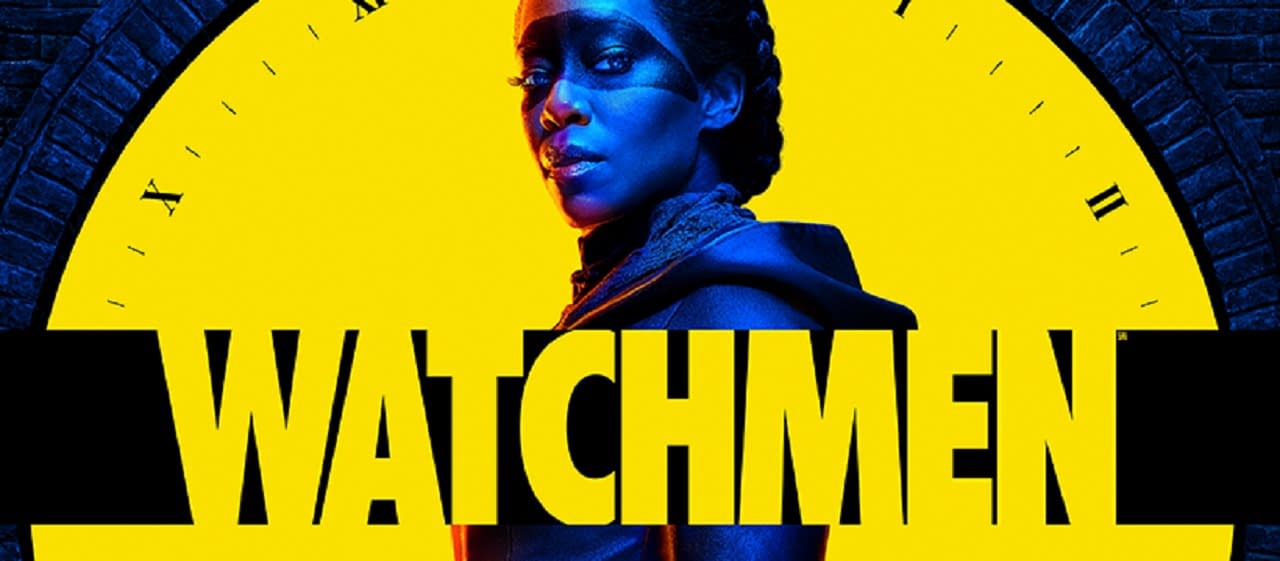
In the following featurette, Lindelof explains how the original comic book series influenced him to take the core themes of the series and find a way to apply them to a modern society. King offers more details on both the terrorist group at play during the season as well as the personal conflicts that arise when one dons a mask in the name of the law:
In the following clip, King takes us behind the scenes on production with a set visit to show us anything and everything Watchmen – or at least what Lindelof will allow:
HBO's Watchmen stars Regina King as Angela Abar, Don Johnson as Chief Judd Crawford, Tim Blake Nelson as Det. Looking Glass, Louis Gossett Jr. as Will Reeves, Adelaide Clemens as Pirate Jenny, Andrew Howard as Red Scare, Jeremy Irons as Adrian Veidt / Ozymandias, Frances Fisher as Jane Crawford, Jacob Ming-Trent as Panda, Yahya Abdul-Mateen II as Cal Abar, Adelynn Spoon as Emma Abar, and Jean Smart as Agent Blake – as well as Tom Mison as Mr. Phillips, Sara Vickers as Ms. Crookshanks, Dylan Schombing, and Lily Rose Smith.
Joining the series in recurring roles are James Wolk as Senator Keane, Hong Chau as Lady Trieu, and Dustin Ingram as Agent Petey.
Watchmen is produced for HBO by White Rabbit in association with Warner Bros. Television; executive producer-writer Lindelof; executive producer/director Kassell; executive producer Tom Spezialy; executive producer-director Stephen Williams; and executive producer Joseph Iberti.
Based on the iconic graphic novel co-created and illustrated by Gibbons and published by DC.
Nine Inch Nails duo Trent Reznor and Atticus Ross are on board to compose music for the series.

In May 2018, Lindelof shared a series of Instagram posts to update fans on progress on the project (with a pilot directed by Kassell) and to emphasize that his vision was not a direct adaptation of the original graphic novel, but rather a "remix" that utilizes important elements from the original story while telling its own narrative. Here are some excerpts from those posts:
"We have no desire to 'adapt' the twelve issues Mr. Moore and Mr. Gibbons created thirty years ago. Those issues are sacred ground and will not be retread nor recreated nor reproduced nor rebooted.
They will however be remixed, Because the bass lines in those familiar tracks are just too good and we'd be fools not to sample them. Those original twelve issues are our Old Testament. When the New Testament came along it did not erase what came before it. Creation. The Garden of Eden. Abraham and Isaac. The Flood. It all happened. And so it will be with 'Watchmen.' The Comedian died. Dan and Laurie fell in love. Ozymandias saved the world and Dr. Manhattan left it just after blowing Rorschach to pieces in the bitter cold of Antarctica."
"This story will be set in the world its creators painstakingly built…but in the tradition of the work that inspired it, this new story must be original. It has to vibrate with the seismic unpredictability of its own tectonic plates. It must ask new questions and explore the world through a fresh lens. Most importantly, it must be contemporary. The Old Testament was specific to the Eighties of Reagan and Thatcher and Gorbachev. Ours needs to resonate with the frequency of Trump and May and Putin and the horse that he rides around on, shirtless. And speaking of Horsemen, The End of the World is off the table…which means the heroes and villains–as if the two are distinguishable–are playing for different stakes entirely."
"Some of the characters will be unknown. New faces. New masks to cover them. We also intend to revisit the past century of Costumed Adventuring through a surprising yet familiar set of eyes…and it is here we will be taking our greatest risks…"


